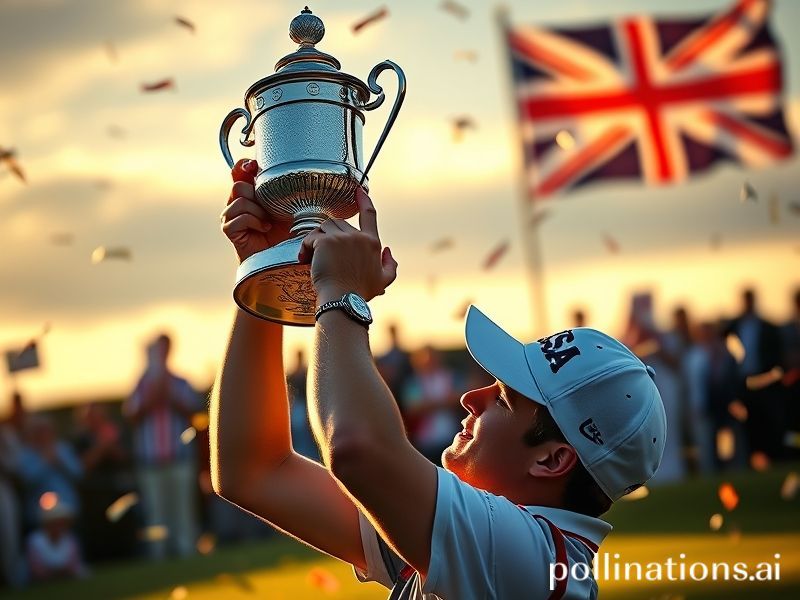USA Clinches Walker Cup in Scotland, Proving Global Supremacy in Plaid and Privilege
Walker Cup Results: When America’s Golfing Teenagers Become Collateral Damage in the Global Soft-Power Arms Race
By “Lucky” Luciano Verde, International Correspondent, Dave’s Locker
St Andrews, Scotland – The scoreboard reads USA 14½, GB&I 11½, which is the polite, tartan-wrapped way of saying the United States has once again weaponized orthodontics and college meal plans to annex a small chunk of Scottish coastline for 48 hours. The 49th Walker Cup ended with the Americans retaining the trophy, a silver chalice so understated it could double as executive desk décor at a mid-tier hedge fund. Yet the reverberations are anything but local; in a world where microchips, vaccines, and rare-earth metals are already geopolitical poker chips, the superpower du jour has now proven it can also dominate in cashmere V-necks.
For those uninitiated, the Walker Cup is biennial proof that the British Isles and the United States still possess enough leisure-class teenagers to stage a miniature Ryder Cup for amateurs. Seventeen-year-olds with swing coaches named “Chad” or “Gareth” duel on hallowed links while the rest of planet Earth debates TikTok bans, grain shortages, and whether the Arctic Circle will become beachfront property by 2035. One can almost hear the ghost of Old Tom Morris whispering, “At least the bombs aren’t falling yet—just Titleists.”
The international implications are deliciously absurd. Japan’s golf economy—already jolted by Hideki Matsuyama’s Masters win—now faces an existential question: if American teens can conquer St Andrews, how long before the next wave of polite, bowing prodigies defects to Stanford? South Korea, which has produced roughly half the LPGA leaderboard, is rumored to be fast-tracking a “golfing conscription” program where promising juniors spend two compulsory years learning to dislike haggis. Meanwhile, China—ever subtle—has dispatched drones above the Old Course to measure wind patterns, claiming it’s for “climate research” and definitely not for reverse-engineering the 3-iron stinger.
Europe, fractured by Brexit, energy crises, and the eternal question of whether to toast bread in a frying pan, found rare unity in losing gallantly. The GB&I squad’s post-match press conference resembled a group therapy session run by the BBC: earnest platitudes, stiff upper lips, and a tacit agreement not to mention that three members will join the LIV Golf feeder tour faster than you can say “sovereign wealth fund.” One almost felt bad for them—until remembering their caddies still earn more per loop than the average Moldovan does in a fiscal quarter.
The Americans, for their part, celebrated with choreographed handshakes that looked suspiciously like SEC football recruiting videos. Their captain—a 46-year-old former Stanford roommate of a sitting senator—thanked “the troops” no fewer than four times without clarifying whether he meant the Marine Corps or the beverage-cart staff. Back home, ESPN cut live to a recruitnik twitch-stream dissecting which phenom might skip college altogether and go straight to the PGA, a decision that now carries roughly the same moral weight as choosing a missile defense contractor.
Global markets, ever alert to metaphor, reacted with the sort of volatility normally reserved for coups. Callaway’s stock ticked up 1.3 %, which analysts attributed to “brand visibility among future credit-card holders.” Whisky futures dipped on the assumption that losing hurts demand, then rebounded when traders remembered Scots drink more when miserable. The only true loser, it seems, is the concept of childhood itself—somewhere an 11-year-old in Jakarta just fired his third swing coach for failing to implement “St Andrews-specific spin-rate data.”
Conclusion
In the grand ledger of civilization, the 2023 Walker Cup changes nothing and yet says everything: that the Anglosphere still conflates fairways with manifest destiny, that soft power now travels via first-class airline vouchers, and that the planet’s most pressing resource shortage may ultimately be parents who let their kids lose without filing an appeal. The trophy will fly home in a bespoke Pelican case, bubble-wrapped against turbulence and irony. The rest of us are left to contemplate a world where the same nation that can’t pass a budget on time can, apparently, coordinate a flawless foursomes strategy in 30-mile-per-hour Scottish gusts. Somewhere, in a UN sub-basement, a delegate from Tuvalu is updating the climate-risk index and muttering, “At least the sea can’t drive the green.” Game, set, match—until 2025, when the circus reconvenes in the Hamptons and we pretend any of this matters more than the melting icecaps currently scheduling a tee time with Florida.







